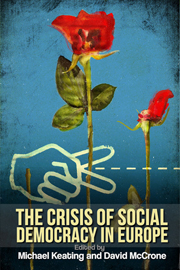Book contents
- Frontmatter
- Contents
- List of tables and figures
- About the contributors
- Preface
- 1 The crisis of social democracy
- 2 The Long Depression, the Great Crash and socialism in Western Europe
- 3 Social democracy in crisis: outlining the trends in Western Europe
- 4 The positions and fortunes of social democratic parties in East Central Europe
- 5 Rethinking public expenditure from a social democratic perspective
- 6 Social democracy in crisis? What crisis?
- 7 Can the Swedish social model survive the decline of the social democrats?
- 8 Multiculturalism, right-wing populism and the crisis of social democracy
- 9 Labour markets, welfare states and the dilemmas of European social democracy
- 10 Class politics and the social investment welfare state
- 11 Labour, skills and education in modern socio-economic development: can there be a social democratic economic and industrial policy in a globalised economy?
- 12 From single market to social market economy: is there room for solidarity?
- 13 Social democracy and security
- 14 Multilevel social democracy: centralisation and decentralisation
- 15 Conclusion
- Bibliography
- Index
15 - Conclusion
Published online by Cambridge University Press: 05 October 2013
- Frontmatter
- Contents
- List of tables and figures
- About the contributors
- Preface
- 1 The crisis of social democracy
- 2 The Long Depression, the Great Crash and socialism in Western Europe
- 3 Social democracy in crisis: outlining the trends in Western Europe
- 4 The positions and fortunes of social democratic parties in East Central Europe
- 5 Rethinking public expenditure from a social democratic perspective
- 6 Social democracy in crisis? What crisis?
- 7 Can the Swedish social model survive the decline of the social democrats?
- 8 Multiculturalism, right-wing populism and the crisis of social democracy
- 9 Labour markets, welfare states and the dilemmas of European social democracy
- 10 Class politics and the social investment welfare state
- 11 Labour, skills and education in modern socio-economic development: can there be a social democratic economic and industrial policy in a globalised economy?
- 12 From single market to social market economy: is there room for solidarity?
- 13 Social democracy and security
- 14 Multilevel social democracy: centralisation and decentralisation
- 15 Conclusion
- Bibliography
- Index
Summary
Two forms of social order died in our big Europe during the years after about 1980: the Communist system embedded in the fifty-year continental order of the Cold War, but also the regulated, social democratic welfare order developed in the nations of Western Europe after 1945. One of these deaths should gladden the soul. But the second should trouble it.
(Ascherson 2012: 17)Is social democracy dead? Or, rather, as Neal Ascherson formulates it, is ‘the regulated, social democratic welfare order’ dead? Readers will possibly have reached their own conclusion, as well as their assessment as to whether it is the more troubling death, if death it is. Our own view is that it is possibly more complicated than that, dependent, as it is, on what we mean by ‘social democracy’ and, crucially, the health or otherwise of its political carriers. History should make us wary of jumping to a conclusion. In this concluding chapter, we will focus on the following key issues: the extent to which social democracy is tied to the changing fortunes of eponymous political parties; what might account for the relative decline in party electoral fortunes; the extent to which social democracy is defined by its social programme, or whether it is more akin to a philosophy or ideology; and finally its prognosis in the post-2008 ‘crisis of capitalism’.
- Type
- Chapter
- Information
- The Crisis of Social Democracy in Europe , pp. 228 - 232Publisher: Edinburgh University PressPrint publication year: 2013



